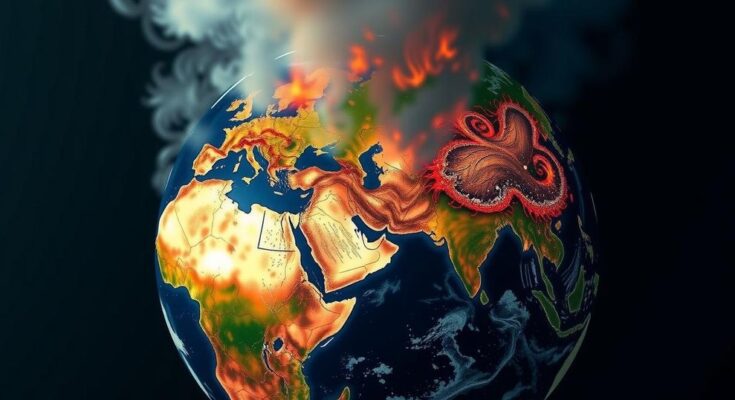The report titled “10 New Insights in Climate Science” underscores the urgent existential threat posed by climate change, highlighting escalating global temperatures and extreme weather events. It emphasizes the need for significant reductions in global emissions to achieve Paris Agreement targets, alongside a focus on equitable climate policies to enhance resilience and adaptation. The insights integrate perspectives from international researchers aiming to inform policy actions leading to COP29.
The report titled “10 New Insights in Climate Science,” released by Future Earth, The Earth League, and the World Climate Research Programme, reflects comprehensive contributions from a network of 80 researchers across 45 countries. In light of the alarming trend of yearly global temperature records, with 2023 showing an increase of 1.45 degrees Celsius above pre-industrial levels, the report indicates that the world is woefully off-target in achieving the Paris Agreement’s goal of limiting warming to 1.5 degrees Celsius. The Global Stocktake (GST), assessed at COP28 in Dubai, emphasizes the need for an aggressive doubling of renewable energy capacity and a significant reduction in global emissions—28% lower than current projections for 2030 to limit warming under 2 degrees Celsius, and a staggering 42% reduction to adhere to the more ambitious 1.5 degrees Celsius target. The report identifies alarming patterns of extreme weather owing to climate change. Notable examples include heightened wildfire risks in Canada and a dramatic 30 times increase in the likelihood of heatwaves in South and Southeast Asia. The report highlights concerning shifts in atmospheric pollutants, illustrating that while levels of harmful aerosols are diminishing—thanks to successful air quality policies—this may lead to an accelerated pace of warming in the short term. This presents a paradox where beneficial air quality initiatives could inadvertently exacerbate climate change impacts. Moreover, the insights paint a stark picture about the current state of habitability, revealing that hundreds of millions are now living in conditions beyond historical norms, especially in vulnerable lower-income and tropical nations. Such extreme weather events not only threaten lives but also devastate ecosystems and economic structures. For instance, heightened intensity from natural El Niño cycles, exacerbated by global warming, is projected to yield costly repercussions amounting to tens of trillions of dollars in economic damages by century’s end. The report stresses the urgency for bolstered climate finance directed toward strengthening the resilience of critical infrastructures against future climate-related shocks. Critical ecosystems like the Amazon rainforest are under threat, and failure to restore such areas may lead to irreversible consequences surpassing those of climate adaptation strategies. Finally, promoting climate-resilient development (CRD) is essential, especially within urban settings that account for a significant share of greenhouse gas emissions. The burgeoning demand for energy transition minerals poses challenges that necessitate effective management spanning the entire value chain. A focus on clean energy must be coupled with supportive governmental policies, such as subsidies. The report concludes by calling for an expansion in the volume and acceptance of climate policy changes. Public acceptance hinges on perceived fairness, asserting that equitable policies are pivotal for widespread adoption. The aim is to deliver actionable insights for delegates attending future climate negotiations, particularly COP29 in Baku, Azerbaijan, pushing for concrete commitments to enhance climate resilience and emission reductions, especially concerning methane and aerosols.
The annual report, “10 New Insights in Climate Science,” serves as a pivotal document informing global climate action, showcasing academic insights compiled from a diverse array of experts in the field. Set against the backdrop of an escalating climate crisis marked by unprecedented global temperature increases, this report reveals the urgency of addressing not only the symptoms of climate change but also its root causes through informed policy changes and technological advancements. By analyzing the evolving landscape of climate science, the report endeavors to not only catalog current knowledge but also to inspire effective responses to mitigate the catastrophic impacts of climate change on populations, economies, and ecosystems.
The 10 New Insights in Climate Science highlights a critical moment in our understanding of climate change, urging immediate action to adapt to and mitigate its effects. This report encapsulates the urgency to lower global emissions significantly while advancing infrastructure resilience, emphasizing that equitable and fair climate policies are indispensable to garnering the public’s support. As the world prepares for negotiations at COP29, the insights provided serve not only as a warning but as a roadmap for future climate action, underscoring the interconnectedness of ecological integrity, societal health, and global economies in the face of ecological upheaval.
Original Source: impakter.com




